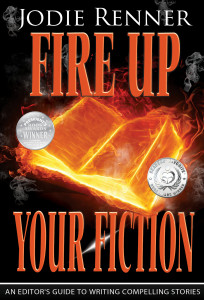 by Jodie Renner, editor & author @JodieRennerEd
by Jodie Renner, editor & author @JodieRennerEd
DO YOUR CHARACTERS’ DECISIONS AND ACTIONS SEEM REALISTIC AND AUTHENTIC?
Have you ever been reading a story when suddenly the protagonist does or says something that makes you think, “Oh come on! Why would he do that?” or “This is crazy. Why doesn’t she…?” or “But I thought he…!” or “I didn’t know he/she could [insert extraordinary ability].” The character seems to be acting illogically, to be making decisions with little motivation or contrary to his personality, abilities, or values
I see this problem a lot in fiction manuscripts I edit. The author needs something to happen for the sake of the plot they’ve planned out in advance, so they force a supposedly intelligent character to do something contrary to common sense and their best interests, like recklessly putting themselves in danger.
For example, I once edited a book where the highly educated, intelligent heroine rose from her bed in the middle of the night and, without telling her husband where she was going or even leaving a note, drove to a remote warehouse to find some incriminating evidence, knowing the killer was likely to return – which of course he did, and attempted to kill her. It made for an exciting scene, but unfortunately, the otherwise savvy character came off looking like a foolhardy, impulsive airhead. I couldn’t help wondering, why wouldn’t she tell her husband? Better yet, call the police and let them handle it. Even police, who are trained for these situations, usually get backup.
Moving your characters around like pawns to suit the plot, if it doesn’t make sense for who they are, could have your readers scratching their heads in disbelief or, worse, throwing your book across the room, then writing a scathing one-star review of it.
Don’t force your characters, kicking and screaming, into actions they just wouldn’t do.
Readers won’t suspend their disbelief and bond with the character if they don’t “buy” what the character is doing and why. An engrossing story needs realistic characters dealing with adversity in bold but realistic and plausible ways.
To make a character’s decisions and actions convincing, take care when creating their background, character, abilities, and motivations.
Background, character, and personality
Of course, you don’t want to make your hero or heroine ordinary, timid, or passive, with few daring decisions, because that would make for a ho-hum book most readers wouldn’t bother finishing. But on the other hand, if you’re going to have them perform daredevil feats, be sure to build that into their makeup.
First, get to know your main characters well. Take some time to develop their background, character, and personality. Are they athletic or more cerebral? Risk-takers or cautious? Do they embrace change, enjoy challenge, love to learn new things? Or do they prefer to stay within their comfort zone? To plumb their depths, do some free-form journaling in which they express their strongest desires, fears, hopes, secrets, regrets, and gripes.
Are they physically capable of what you want them to do?
Abilities
If, for a riveting plot, you need your hero to do something heroic, almost superhuman, make sure he has the determination, strength, flexibility, and endurance to do that. Although it’s amazing what people are able to do under duress with the adrenaline flowing, it’s more credible if your character is already at least somewhat fit. Does he work out a lot to maintain muscle mass, agility, and endurance? How? Also, he’ll need to be intelligent, skilled, and resourceful.
If he needs special skills, show earlier on that he possesses them and how it all makes sense, given his overall makeup. In one novel I edited, the sedentary, slightly overweight, middle-aged protagonist fought off a strong attacker with quick, expert martial arts moves. This was an “Oh, come on!” moment, given his lifestyle, age, and paunch.
In The Hunger Games, we learn early on that Katniss is an expert at archery, which is a huge factor in her survival later. A nerdy banker probably doesn’t do kickboxing on the side, so you may need to make him less desk-bound and more athletic for it to work. Or give him another profession.
If you’re writing fantasy, of course you have more leeway with unusual characters and situations, but if you’re writing a realistic genre, with no supernatural or paranormal elements, make sure the character’s actions are realistic and make sense.
Motivations
Is your hero sufficiently motivated to put his life on the line? Do those motivations fit with his belief system, background, and immediate needs? If you want or need a character to do something dangerous, go back and give him some burning reasons for choosing that course of action.
Perhaps he finds himself in a life-and-death situation for himself or someone he loves, or innocent people are in grave danger. His love, concern, and determination will make him more selfless and daring, bringing out courage he never knew he had.
As Steven James advises in Story Trumps Structure, as you’re writing your story, ask yourself , “What would this character naturally do in this situation? Is he properly motivated to take this action?”
Causality
Be sure your narrative is also shaped by the logic of cause and effect. For your story to be believable, character decisions and reactions need to plausibly follow the original stimulus or actions. If your character overreacts or underreacts to what has just happened, they won’t seem “in character” or real.
Be sure every decision and action makes sense with what preceded it. As James suggests, as you go along, continually ask yourself, “What would naturally happen next?”
So don’t force your characters to act in uncharacteristic ways because your plot needs them to. Readers will pick up on that. Rather than insisting certain events or actions happen as you had planned, instead allow the natural sequence of events and logical reactions to shape your plotline.
Go through your story to make sure your characters are acting and reacting in ways that are authentic to who they are and where they’ve come from, and that they’re sufficiently motivated to take risks. Also, do their reactions fit with the stimulus? Is that a logical response to what happened?
Ask yourself, as you’re writing, “Is there a way to accomplish this that fits with the character’s values and personality?” If not, I suggest you either change the plot (have them make a different decision and rewrite where that leads them) or go back and change some of the character’s basic attributes, values, and skills. Or add in incidents in their past that have shaped them in ways that will justify their current actions.
That way your plot will flow seamlessly and your characters will seem real. There will be no bumps, no hiccups where readers will be suddenly jolted out of the story.
As William Faulkner advised one of his fiction-writing classes,
“…get the character in your mind. Once he is in your mind, and he is right, and he’s true, then he does the work himself. All you need to do then is to trot along behind him and put down what he does and what he says.”
So don’t impose your preconceived ideas on the character – you risk making him do things he just wouldn’t do. Know your characters really well and the rest will naturally follow.
 Jodie Renner is a freelance fiction editor and the award-winning author of three craft-of-writing guides in her series An Editor’s Guide to Writing Compelling Fiction: Captivate Your Readers, Fire up Your Fiction, and Writing a Killer Thriller. She has also published two clickable time-saving e-resources to date: Quick Clicks: Spelling List and Quick Clicks: Word Usage. You can find Jodie at www.JodieRenner.com, www.JodieRennerEditing.com, her blog, http://jodierennerediting.blogspot.com/, and on Facebook, Twitter, and Google+.
Jodie Renner is a freelance fiction editor and the award-winning author of three craft-of-writing guides in her series An Editor’s Guide to Writing Compelling Fiction: Captivate Your Readers, Fire up Your Fiction, and Writing a Killer Thriller. She has also published two clickable time-saving e-resources to date: Quick Clicks: Spelling List and Quick Clicks: Word Usage. You can find Jodie at www.JodieRenner.com, www.JodieRennerEditing.com, her blog, http://jodierennerediting.blogspot.com/, and on Facebook, Twitter, and Google+.
